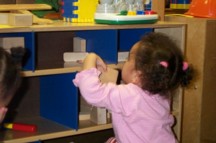 |
The Learning Ladder II
|
| Module 2: The Role of Play | ||||
| Part 1 | Part 2 | Part 3 | Part 4 | Part 5 |
Welcome to the Introduction to Module 2!

Module Objectives
Children learn when they play. This module will help you understand the value of play in children's learning and development. It will also help you understand your role in supporting children's play.
In this module you will learn ...
- the value of play.
- the developmental stages of play.
- how children learn in the different kinds of play.
- how adults can extend and facilitate children's play.
In this module you will ...
- identify the three developmental stages of play.
- describe three ways a child plays.
- observe the different kinds of play.
- create an activity for parents to support children's play at home.
Terms from the Field
Below are words and definitions that you may need when you work as a Family Child Care Provider. You will learn more about these words later in the module.
When you see the speaker
![]() after each of the definitions you can hear the pronunciation of the term
and what it means.
after each of the definitions you can hear the pronunciation of the term
and what it means.
free play - Free play is a time in a program's daily schedule that allows children to select where and what they will play with. For example, during free play Tamara might decide to play at the sand table with cups.
|
free play [WAV] (149kb WAV file) free play [RAM] (31kb RAM file) |
developmental stages - Developmental stages are periods of time when children learn to do certain things and improve their skills. For example, children do not learn to share toys and play together when they are infants. They learn to cooperate with others in a later developmental stage.
|
developmental stages [WAV] (172kb WAV file) developmental stages [RAM] (35kb RAM file) |
mastering a skill - Mastering a skill is practicing something until we can do it. For example, a child might practice bouncing a ball until he or she can master it.
|
mastering a skill [WAV] (106kb WAV file) mastering a skill [RAM] (23kb RAM file) |
fine motor skill - Fine motor skill is the ability to use hands and fingers to complete skills such as writing with a pen or cutting with scissors.
|
fine motor skill [WAV] (90kb WAV file) fine motor skill [RAM] (19kb RAM file) |
sensory awareness - Sensory awareness is when we know that we are using one of our five senses (touch, smell, taste, hearing, and speaking). For example we know we are tasting something sour when we eat a lemon.
|
sensory awareness [WAV] (148kb WAV file) sensory awareness [RAM] (31kb RAM file) |
If you find other words that you don't understand, you can do two things :
1. Learn how to identify a word without a dictionary.
Or
2. Use an online dictionary that will be at the bottom of each page. See below.
| Now go to the activities for Part 1. | |
